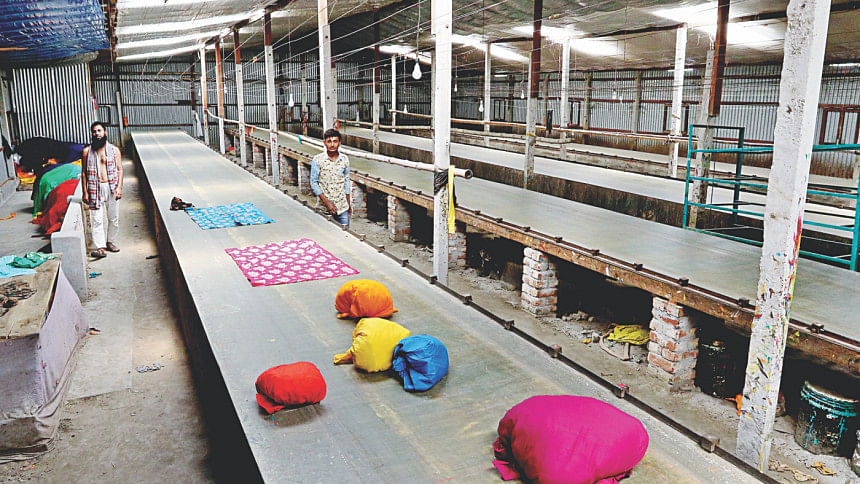Losses when profit was to be made

Six months ago, Abul Bashar invested around Tk 1.5 lakh in setting up two new 40-yard tables at his home-cum-factory. He was targeting bumper demand of batik clothes ahead of Pahela Baishakh and Eid-ul-Fitr.
He is now resigned to the fact that he will have to write it off as a bad investment, with no chance of getting a return on it, at least in this year.
Bashar already had two other tables of the same length for laying out the fabric for printing. "This is usually our peak season for business. We get a lot of orders and have to finish these amid a tight schedule," said Bashar, who had dark circles under his eyes.
This year, batik makers' business lies in tatters due to coronavirus outbreak, small boutiques and large shopping centres alike remain closed since March 25.
Bashar is one of several hundred factory owners and workers anxious about their livelihoods as they stay at home without work at Banti, a village in Narayanganj's Araihazar upazila.
Banti has earned fame for its batik clothes, mostly printed by hand, inspiring nearby villages to also take up the business.
During a visit to the village earlier this month, The Daily Star found shops closed on the deserted main road around noon. Two elderly men were talking in front of a closed shop.
Asked why there were no dyed cloths drying outside, one of them replied that all batik printing work has been off since March 26.
Around 200 metres to the west of the main road, Bashar's factory gates were locked. He was initially reluctant to come outside but later agreed to show this correspondent around his factory, which can produce around 1,500 three-pieces [shalwar kameez sets] every week.
"Don't know what will happen in the future. For now, I am accepting the loss," he said.
The situation of around 1,000 families who work in the business is similar. Several hundred families of nearby villages, whose livelihoods also depend on the batik printing business, share the fate.
Bashar and others reminisced how the demand for batik clothes and home décor items goes up at the onset of every summer, peaking just before festivals like Pahela Baishakh and Eid-ul-Fitr.
Ahead of these festivals, the whole area would usually be vibrant with batik cloths of different colours, shapes, and sizes hung out to dry under the sun after being dyed -- covering almost every inch of available space.
The area would buzz with energy as batik workers dye, print, wash, dry, fold, and package the material that constitutes a major part of the area's economy.
With the extra demand at this time, skilled workers from other areas would come to Banti in search of seasonal work. The workers printing patterns on fabrics would often work through the nights in order to fulfil their orders.
This year, however, is vastly different amid coronavirus
Helaluddin and two others were printing inside a factory, locked from the outside. He only agreed to come out and talk after making sure this correspondent was not from the local administration or the police.
The factory he works in produces around 1,000 three-pieces in a week.
"If we do not work, how we will get money?" asked Helaluddin.
A seasoned worker is paid Tk 20,000 per month, with less skilled workers getting around Tk 10,000, said locals.
"If the situation continues, we will lose our jobs. God knows what will happen," said Helaluddin.
Wholesale customers from nearby cities and towns, including Dhaka and Munshiganj, come to Banti and nearby bazaars to buy the batik clothes and materials produced here.
Now, with no shopping hordes and limited festivities across the country, demand has dropped sharply, and with it, the livelihoods of these workers and a business that usually thrives at this time of year.
While Helaluddin was talking with this correspondent, Milon Bhuiyan came forward.
He said had had closed down his wax batik factory on March 26. He had six workers, who usually earn around Tk 3,000 a month.
"I have asked all my workers not to come to work. I don't have business, what else I can do?"

 For all latest news, follow The Daily Star's Google News channel.
For all latest news, follow The Daily Star's Google News channel. 



Comments